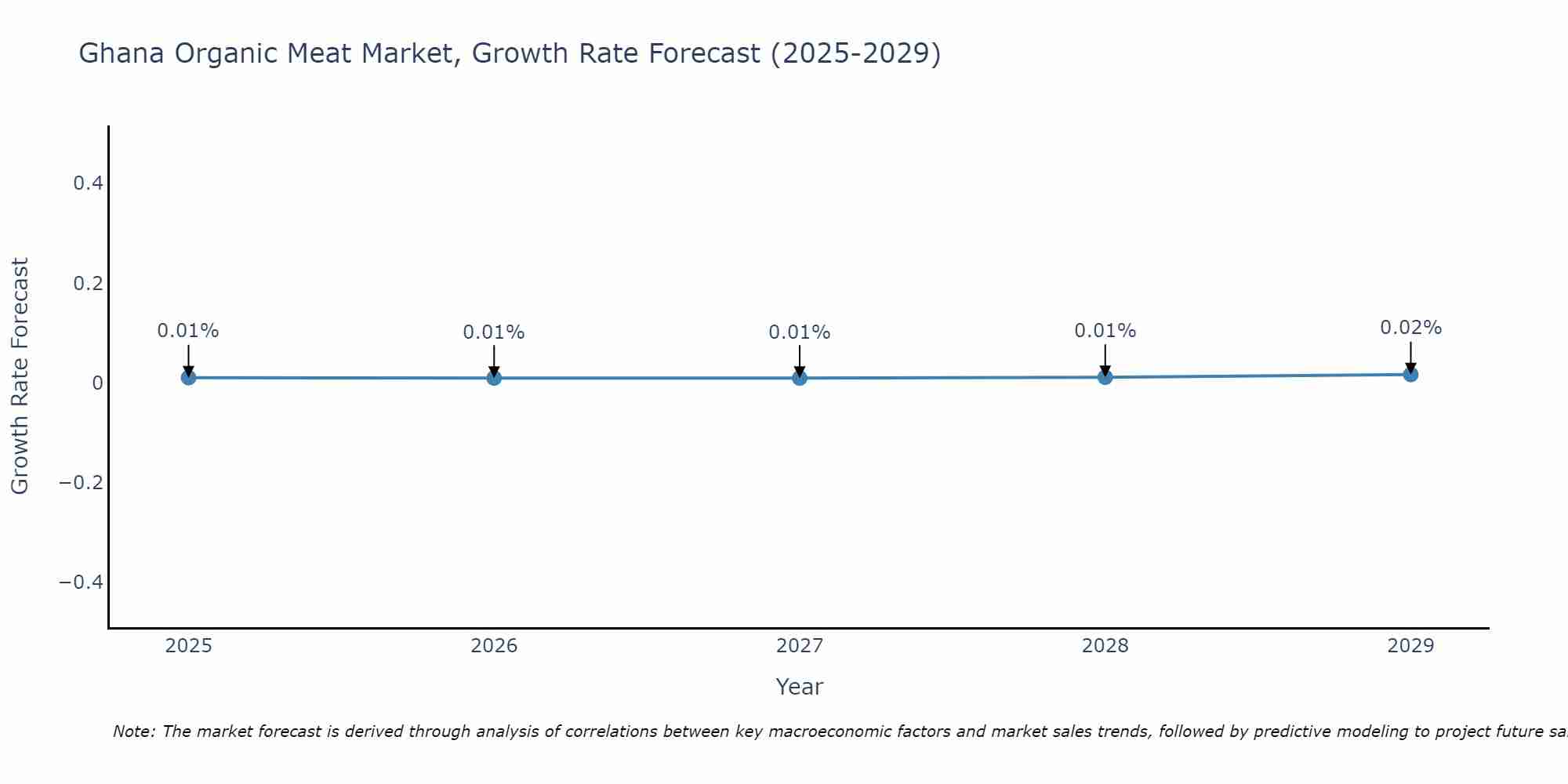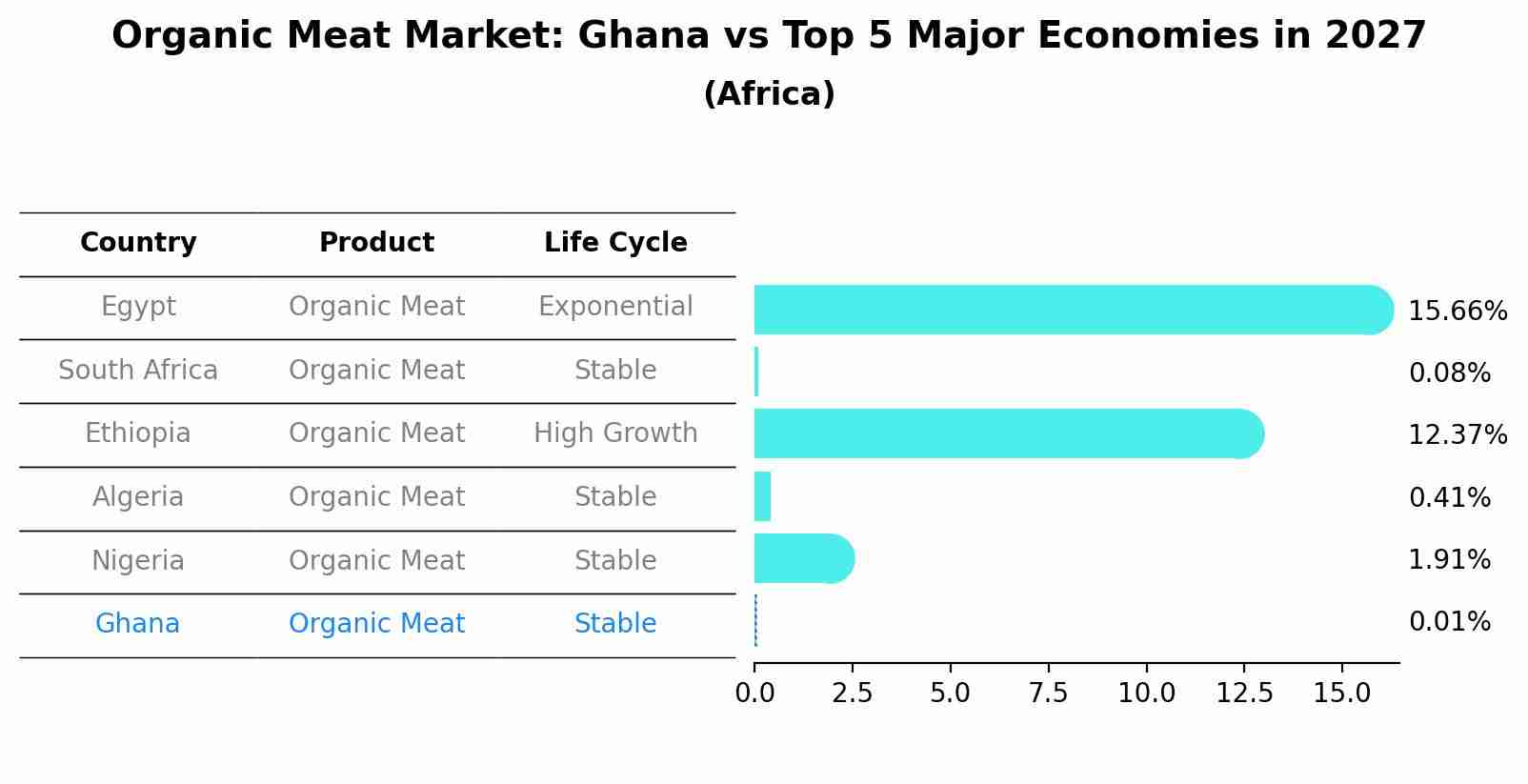Ghana Organic Meat Market (2025-2031) Outlook | Value, Revenue, Industry, Growth, Size, Analysis, Trends, Share, Forecast & Companies
| Product Code: ETC383636 | Publication Date: Aug 2022 | Updated Date: Jul 2025 | Product Type: Market Research Report | |
| Publisher: 6Wresearch | Author: Dhaval Chaurasia | No. of Pages: 75 | No. of Figures: 35 | No. of Tables: 20 |
Ghana Organic Meat Market Size Growth Rate
The Ghana Organic Meat Market is projected to witness mixed growth rate patterns during 2025 to 2029. Commencing at 0.01% in 2025, growth builds up to 0.02% by 2029.

Organic Meat Market: Ghana vs Top 5 Major Economies in 2027 (Africa)
The Organic Meat market in Ghana is projected to grow at a stable growth rate of 0.01% by 2027, highlighting the country's increasing focus on advanced technologies within the Africa region, where Egypt holds the dominant position, followed closely by South Africa, Ethiopia, Algeria and Nigeria, shaping overall regional demand.

Ghana Organic Meat Market Synopsis
The Ghana Organic Meat Market is experiencing steady growth driven by increasing consumer demand for healthier and environmentally sustainable food options. The market is primarily dominated by small-scale organic farmers who adhere to strict organic farming practices, including the prohibition of synthetic chemicals and antibiotics in animal husbandry. Key players in the market include local organic meat producers, as well as international brands aiming to capitalize on the growing interest in organic products. Factors such as rising disposable incomes, health-conscious consumer preferences, and government initiatives promoting organic agriculture are propelling the market forward. However, challenges such as high production costs, limited availability of organic feed, and inadequate infrastructure pose barriers to market expansion. Overall, the Ghana Organic Meat Market presents opportunities for growth and innovation in the organic food sector.
Ghana Organic Meat Market Trends
The Ghana Organic Meat Market is currently experiencing a growing demand for organic and ethically sourced meat products. Consumers are increasingly concerned about food safety, animal welfare, and environmental sustainability, leading to a shift towards organic meat options. Local farmers and producers are responding to this trend by offering a wider variety of organic meat products, including beef, pork, and poultry. Additionally, there is a rising interest in grass-fed and free-range meat options, as well as a preference for locally sourced organic meats over imported products. This trend is expected to continue as consumers become more health-conscious and environmentally aware, driving further growth in the Ghana Organic Meat Market.
Ghana Organic Meat Market Challenges
In the Ghana Organic Meat Market, some challenges faced include limited consumer awareness and education about the benefits of organic meat, resulting in a smaller market size compared to conventional meat products. Additionally, high production costs due to organic certification requirements, lack of infrastructure for organic farming practices, and limited availability of organic feed are obstacles for local producers. Distribution and retail channels for organic meat are also underdeveloped, impacting the accessibility of these products to consumers. Furthermore, competition from cheaper imported meats and inconsistent supply due to weather conditions and seasonal variations pose challenges for sustainable growth in the Ghana Organic Meat Market. Addressing these challenges would require investment in consumer education, infrastructure development, and support for local organic meat producers.
Ghana Organic Meat Market Investment Opportunities
The Ghana Organic Meat Market presents promising investment opportunities due to the increasing consumer demand for healthier and sustainably sourced food products. Investors can consider opportunities in organic livestock farming, processing facilities, distribution networks, and retail outlets specializing in organic meat products. With the growing awareness of the health and environmental benefits of organic meat, there is a potential for significant market growth and profitability in Ghana. Collaborating with local farmers to promote sustainable farming practices and ensuring compliance with organic certification standards can be key strategies for success in this market. Additionally, leveraging digital marketing and e-commerce platforms can help reach a wider customer base and drive sales in this burgeoning sector.
Jordan Agar Market Government Policies
The Ghanaian government has implemented policies to promote the growth of the organic meat market in the country. These policies include the establishment of standards and regulations for organic meat production, certification, and labeling to ensure quality and consumer trust. Additionally, the government has provided support through training programs, subsidies, and incentives to encourage farmers to transition to organic practices. Furthermore, there are initiatives in place to promote awareness and education about the benefits of organic meat consumption among the public. Overall, the government`s efforts aim to boost the organic meat sector in Ghana by creating a conducive environment for producers and increasing consumer demand for sustainable and environmentally friendly meat products.
Ghana Organic Meat Market Future Outlook
The future outlook for the Ghana Organic Meat Market appears promising, driven by increasing consumer awareness and demand for healthier and sustainably produced food options. With a growing focus on sustainability and ethical consumption practices, more consumers are seeking out organic and ethically sourced meat products. Additionally, the Ghanaian government`s initiatives to promote organic farming and agriculture are expected to further support the growth of the organic meat market in the country. Collaborations between local farmers and international organic certification bodies are also likely to enhance the credibility and quality of organic meat products in the market. Overall, the Ghana Organic Meat Market is poised for expansion as consumers prioritize health, environmental concerns, and ethical considerations in their food choices.
Key Highlights of the Report:
- Ghana Organic Meat Market Outlook
- Market Size of Ghana Organic Meat Market, 2024
- Forecast of Ghana Organic Meat Market, 2031
- Historical Data and Forecast of Ghana Organic Meat Revenues & Volume for the Period 2021 - 2031
- Ghana Organic Meat Market Trend Evolution
- Ghana Organic Meat Market Drivers and Challenges
- Ghana Organic Meat Price Trends
- Ghana Organic Meat Porter's Five Forces
- Ghana Organic Meat Industry Life Cycle
- Historical Data and Forecast of Ghana Organic Meat Market Revenues & Volume By Type for the Period 2021 - 2031
- Historical Data and Forecast of Ghana Organic Meat Market Revenues & Volume By Poultry for the Period 2021 - 2031
- Historical Data and Forecast of Ghana Organic Meat Market Revenues & Volume By Beef for the Period 2021 - 2031
- Historical Data and Forecast of Ghana Organic Meat Market Revenues & Volume By Pork for the Period 2021 - 2031
- Historical Data and Forecast of Ghana Organic Meat Market Revenues & Volume By Others for the Period 2021 - 2031
- Historical Data and Forecast of Ghana Organic Meat Market Revenues & Volume By Application for the Period 2021 - 2031
- Historical Data and Forecast of Ghana Organic Meat Market Revenues & Volume By Food Services for the Period 2021 - 2031
- Historical Data and Forecast of Ghana Organic Meat Market Revenues & Volume By Retail for the Period 2021 - 2031
- Historical Data and Forecast of Ghana Organic Meat Market Revenues & Volume By Distribution Channel for the Period 2021 - 2031
- Historical Data and Forecast of Ghana Organic Meat Market Revenues & Volume By B2C for the Period 2021 - 2031
- Historical Data and Forecast of Ghana Organic Meat Market Revenues & Volume By B2B for the Period 2021 - 2031
- Ghana Organic Meat Import Export Trade Statistics
- Market Opportunity Assessment By Type
- Market Opportunity Assessment By Application
- Market Opportunity Assessment By Distribution Channel
- Ghana Organic Meat Top Companies Market Share
- Ghana Organic Meat Competitive Benchmarking By Technical and Operational Parameters
- Ghana Organic Meat Company Profiles
- Ghana Organic Meat Key Strategic Recommendations
Frequently Asked Questions About the Market Study (FAQs):
- Single User License$ 1,995
- Department License$ 2,400
- Site License$ 3,120
- Global License$ 3,795
Search
Thought Leadership and Analyst Meet
Our Clients
Related Reports
- Afghanistan Apparel Market (2026-2032) | Growth, Outlook, Industry, Segmentation, Forecast, Size, Companies, Trends, Value, Share, Analysis & Revenue
- Canada Oil and Gas Market (2026-2032) | Share, Segmentation, Value, Industry, Trends, Forecast, Analysis, Size & Revenue, Growth, Competitive Landscape, Outlook, Companies
- Germany Breakfast Food Market (2026-2032) | Industry, Share, Growth, Size, Companies, Value, Analysis, Revenue, Trends, Forecast & Outlook
- Australia Briquette Market (2025-2031) | Growth, Size, Revenue, Forecast, Analysis, Trends, Value, Share, Industry & Companies
- Vietnam System Integrator Market (2025-2031) | Size, Companies, Analysis, Industry, Value, Forecast, Growth, Trends, Revenue & Share
- ASEAN and Thailand Brain Health Supplements Market (2025-2031) | Strategy, Consumer Insights, Analysis, Investment Trends, Opportunities, Growth, Size, Share, Industry, Revenue, Segments, Value, Segmentation, Supply, Forecast, Restraints, Outlook, Competition, Drivers, Trends, Demand, Pricing Analysis, Competitive, Strategic Insights, Companies, Challenges
- ASEAN Bearings Market (2025-2031) | Strategy, Consumer Insights, Analysis, Investment Trends, Opportunities, Growth, Size, Share, Industry, Revenue, Segments, Value, Segmentation, Supply, Forecast, Restraints, Outlook, Competition, Drivers, Trends, Demand, Pricing Analysis, Competitive, Strategic Insights, Companies, Challenges
- Europe Flooring Market (2025-2031) | Outlook, Share, Industry, Trends, Forecast, Companies, Revenue, Size, Analysis, Growth & Value
- Saudi Arabia Manlift Market (2025-2031) | Outlook, Size, Growth, Trends, Companies, Industry, Revenue, Value, Share, Forecast & Analysis
- Uganda Excavator, Crane, and Wheel Loaders Market (2025-2031) | Strategy, Consumer Insights, Analysis, Investment Trends, Opportunities, Growth, Size, Share, Industry, Revenue, Segments, Value, Segmentation, Supply, Forecast, Restraints, Outlook, Competition, Drivers, Trends, Demand, Pricing Analysis, Competitive, Strategic Insights, Companies, Challenges
Industry Events and Analyst Meet
Whitepaper
- Middle East & Africa Commercial Security Market Click here to view more.
- Middle East & Africa Fire Safety Systems & Equipment Market Click here to view more.
- GCC Drone Market Click here to view more.
- Middle East Lighting Fixture Market Click here to view more.
- GCC Physical & Perimeter Security Market Click here to view more.
6WResearch In News
- Doha a strategic location for EV manufacturing hub: IPA Qatar
- Demand for luxury TVs surging in the GCC, says Samsung
- Empowering Growth: The Thriving Journey of Bangladesh’s Cable Industry
- Demand for luxury TVs surging in the GCC, says Samsung
- Video call with a traditional healer? Once unthinkable, it’s now common in South Africa
- Intelligent Buildings To Smooth GCC’s Path To Net Zero


















